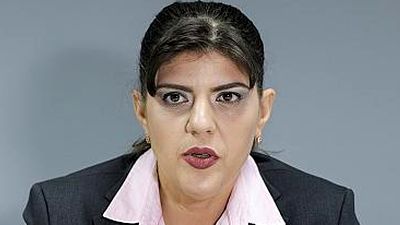HIGH COURT UNDER DNA-SRI TERROR - Two-thirds of ICCJ judges had fabricated files at the DNA: "More than 75 High Court judges were targeted." About 100 judges from the Bucharest Court of Appeal were targeted by DNA. The SCM confirms the involvement of the SRI in the DNA investigations: "It is also necessary to verify compliance with the legal provisions regarding the issuance of national security mandates." Read the horror figures (Document)
 At least 75 judges from the High Court of Cassation and Justice (ICCJ) were targeted by National Anti-corruption Directorate (DNA) files during the tenure of Laura Kovesi (photo). Which means that two thirds of the judges in ICCJ, where a little over 100 magistrates operate, were targeted by DNA files, many of them being intercepted and surveyed.
At least 75 judges from the High Court of Cassation and Justice (ICCJ) were targeted by National Anti-corruption Directorate (DNA) files during the tenure of Laura Kovesi (photo). Which means that two thirds of the judges in ICCJ, where a little over 100 magistrates operate, were targeted by DNA files, many of them being intercepted and surveyed.
The DNA terror figures are presented in the decision of the Plenary of the Superior Council of Magistracy, published on Thursday, January 9, 2019, which approved the Judicial Inspection Report on the DNA criminal files against almost 3,000 judges and prosecutors between 1.01.2014 - 31.07.2018.
More precisely it is about the Report of the Judicial Inspection on "Compliance with the general principles that govern the activity of the Judicial Authority in the cases of competence of the National Anticorruption Directorate regarding the magistrates or in relation to them". A report that was presented by the Lumea Justitiei (World of Justice) website on each DNA county structure separately, in the series entitled "Magistrates under the DNA 's boot".
Decision of the SCM Plenum no. 225 of October 15, 2019 - which must be said that it was adopted without the vote of the „rebels” from the Council, but only with the healthy part of the Council - presents a horrific statistic with high ranked courts from Romania where most of the judges became targets for DNA. This fact can explain many aspects, including how some judges came to deliver ongoing judgments on DNA s pleasure, blackmailed and pressed by the files opened against them by anti-corruption prosecutor's office. Specifically, during 2014-2018, DNA opened files against 1,900 judges. The SCM decision also offers examples regarding the magnitude of the phenomenon, with data from judges from several high ranked courts that were targeted by the anti-corruption prosecutor's office:
- High Court of Cassation and Justice: over 75 judges were subject to DNA files;
- Bucharest Court of Appeal: about 100 judges had DNA files;
- Oradea Court of Appeal: about 35 judges had DNA files;
- Ploiesti Court of Appeal: about 30 judges had DNA files;
- Brasov Court of Appeal: approximately 25 judges had DNA files;
- Iasi Court of Appeal: about 20 judges had DNA files;
- Constanta Court of Appeal: over 15 judges had DNA files;
- Bucharest Court: over 85 judges had DNA files;
- Arges Court: over 25 judges had DNA files;
- Dolj Court: over 25 judges had DNA files.
Mass surveillance
A very important aspect must be emphasized. Which is that out of 1900 files opened by the DNA against the judges, only a small number was sent to court. In fact, the files represented not only an instrument of blackmail and pressure for the judges, as the traditional and serious associations of the magistrates themselves accused, but also a way of supervising them. In many files opened against the judges, the DNA had taping and surveillance measures. Which means that they had access to the judges' discussions in the files where the DNA was of interest. Moreover, the SCM Decision observes that files in which the taping and surveilling of the judges were authorised, were dismissed and closed in blocks by the DNA after SIIJ became operative. However, SCM still needs to do one thing. Namely to publish the nominal list of judges with files opened by DNA, which were monitored by the anti-corruption prosecutor's office. We are convinced that among them we will find judges who today protest against the SIIJ - and thus, they can be convinced that by the abolition of the SIIJ there is a risk that the terror of DNA will return - but also judges who were considered to be close to the anticorruption prosecutors.
SCM confirms the interference of SRI. Control on national security warrants
On the other hand, the same decision of the SCM confirms another extremely serious problem. Specifically, the SCM discloses the involvement of the SRI in the DNA investigations, the officers of the Service carrying out some specific acts for the criminal investigation activity. Also, a good omen, we believe, is that the SCM proposed to initiate checks on compliance with the legal provisions regarding the mandates on national security issued for the supervision of magistrates.
Here are the conclusions of the decision of the SCM Plenum, which we attached at the end of the article:
"The Plenary of the Superior Council of Magistracy ascertain a judicial reasoning on the factual findings and conclusions of the report submitted for analyse, regarding the criminal prosecution activity, as follows:
The unjustified duration of the investigations in numerous files, mainly due to the lack of rhythmicity in the criminal prosecution, correlated with periods of inactivity.
Violation of the procedural rules by the prosecutors who carried out the criminal prosecution, consisting of the following:
- violation of the procedural norms regarding the obligation of the prosecutor to inform the person intercepted / technically surveilled, respectively the absence of the orders of adjournment of the measure, as well as the failure to communicate the dismissal solutions to the magistrates there were targeted by the investigations;
- non-existence of criminal prosecution orders 'in rem’;
- issuing orders for delegation of attributions 'in white', respectively the execution of acts of criminal prosecution by the criminal investigation bodies in the absence of delegation;
- the redistribution of the criminal files without any reasoning / justification of the measure;
- carrying out specific acts for the criminal prosecution activity;
- the use of requesting files pending in different courts in order to evaluate the measures / solutions pronounced by judges from a possible criminal perspective.
Other inadequate aspects remarked
- The request for taking over criminal cases by the DNA Central Structure according to the decision given by the judge for the extension of technical surveillance aimed at other judges;
- Statements consisted of inadequate comments regarding the solutions delivered by judges, in acts performed / formulated by DNA prosecutors;
- The technique of the ex officio indictments, especially against judges in relationship to their judgments.
- Mass closures of cases left unworked, sometimes even for a very long period of time, before the Criminal Investigation Section from Justice became operative.
From the perspective of observing the guarantees provided by the law for the magistrates involved in the cases opened by the National Anticorruption Directorate, it can be noted that there are major deficiencies regarding the making of the criminal prosecution documents in a number of cases.
Thus, the fairness of the procedure assumes, according to the ECHR jurisprudence, to ensure a balance between defending the general interest of the company, of punishing all crimes, on the one hand, and the legitimate interest of each innocent person, for not being subjected to criminal constraint, on the other hand.
Also, equity implies a permanent concern not to unduly infringe the fundamental rights and freedoms enshrined in the Constitution, which means strong guarantees that will prevent any abuse and remove the consequences of violations of the law by the judicial bodies.
As a component of fairness, the reasonable nature of the extend of the proceedings is assessed according to the circumstances of the case and taking into account the criteria established by the ECHR jurisprudence, respectively the complexity of the case, the behaviour of the applicant, the behaviour of the authorities and the importance for the defendant of the object of the case.
However, from the analysis of the situations presented in the Judicial Inspection Report, results that the way of exercising the attributions by the criminal prosecution bodies came out of the goal established by the ECHR, with the consequence of violating the reasonable duration of the procedure and its fairness.
In many cases, periods of unjustified inactivity (on the order of years) have been found, following the disruption of technical supervision measures, often for significant periods of time, measures which, by their nature, have an extremely high degree of intrusion. in the rights and freedoms of the magistrates concerned.In many situations, the inactivity of the criminal prosecution bodies has been doubled by measures to postpone the insights of the data subjects regarding the technical supervision exercised, which undoubtedly amplified the negative consequences on the fundamental rights and freedoms of the magistrates concerned.
At the same time, in the cases presented, there is a clear lack of interest in the criminal prosecution bodies for resolving the case, even in the conditions in which, as was sometimes held in the classification ordinance, there were no indications of an offense.In relation to the circumstances mentioned above, one can come to the conclusion of the impairment of the guarantees of independence of the magistrates who were the subject of the investigation in this case, as a direct consequence of the way in which the criminal investigation was carried out.In carrying out the criminal trial, the judicial bodies must ensure the strict observance of the law, an imperative that is imposed both in regard to the actions of the other participants in the criminal process, as well as, above all, the actions of the judicial bodies themselves.
Beyond the flagrant disregard of some procedural provisions of imperative character, the deficiencies highlighted by the Judicial Inspection Report raised serious doubts regarding the appearance of impartiality which should characterise the conduct of the criminal prosecution bodies during the criminal trial.
Serious deviations from the criminal procedural norms, materialised in the non-respecting the obligation to inform the persons subject to the technical surveillance measure, the lack of the order to start the criminal prosecution in rem, the issuing of orders for delegation of the attributions 'in white' (the measure meant allow the elaboration of some works with unrealistic data), the redistribution of the files without any justification / reasoning of the measure, the making of specific acts for the criminal prosecution activity by officers of the Romanian Intelligence Service in cases regarding magistrates or the practice of requesting files pending courts decisions, in order to evaluate the measures / solutions of the judges, besides the procedural consequences on which only the competent judicial bodies can rule, according to the law, generates, without no doubt, in the public perception, the distrust in the impartiality of the criminal prosecution bodies or, moreover, the justified fear that their activity is not subordinated to the law.
All the circumstances described above have, cumulatively, the consequence of being an obvious pressure factor on the magistrates concerned by the files in question, constituting, at the same time, in a severe impairment of the principle of the legality of the criminal trial and of the presumption of innocence, which are the foundations of a fair criminal trial. In the same context, other working methods of the criminal investigation bodies are registered, highlighted by the findings of the judicial inspectors.
Thus, relevant is the large number of judges concerned by criminal prosecution activities in cases under the National Anticorruption Directorate (Central Structure and Territorial Structures), viewed in correlation with the total number of judges in the respective courts, on the one hand, and with the fact that in the overwhelming majority of these cases criminal settlement solutions were arranged.
For example, at the High Court of Cassation and Justice were visited more than 75 judges (9 of them being investigated at the territorial services Brasov, Oradea, Constanta), at the Bucharest Court of Appeal about 100 judges, at the Oradea Court of Appeal about 35 judges (out of about 40 judges), at the Ploiesti Court of Appeal about 30 judges (out of about 50 judges), at the Brasov Court of Appeal about 25 judges, at the Iasi Court of Appeal about 20 judges (from about 45 judges), at the Constanta Court of Appeal more than 15 judges (out of 60 judges), at the Bucharest Court more than 85 judges, at the Arges Tribunal more than 25 judges (out of about 40 judges), at the Dolj Court more than 25 judges (out of over 70 judges).
In total, at the level of the Central Structure and the territorial structure of the National Anticorruption Directorate, over 1900 judges were targeted.
The practices of DNA prosecutors who have opened cases with judges in the ways mentioned above have represented forms of pressure on them, with direct consequences regarding the execution of the act of justice.
Thus, the technique of ex officio indictments against the judges and their search for the solutions disposed in the cases is an unacceptable fact, of an unprecedented gravity, which undoubtedly represents a factor of pressure not only on those concerned, but on the entire professional body of judges.
The suspicions about prosecutor's procedures within the National Anti-corruption Directorate are amplified by the fact that files left unworked for a long period of time, after previously been provided with technical surveillance for significant periods of time, were closed in mass, by not sending to court, only just before the Section for investigating criminal offences in justice became operative.
Such practices raises serious questions about the reasons that have justified the keeping of certain causes for a period of time for years and determines legitimate suspicions regarding their existence and, in this way, a factor of pressure among the activity of magistrates, and finally, on the parties' right for a fair trial.
In the same records joins the practice of requesting files pending in different courts registered in order to evaluate the measures / solutions pronounced by judges from a possible criminal perspective. In fact, this manner of inquiry represented a true intrusion into the judge's freedom of appreciation.
At the same time, it is found that the general objective of the control, established by order of the chief inspector of the Judicial Inspection, was to respect the general principles governing the criminal prosecution activity, respectively the activity of trial in the cases of competence of the National Anticorruption Directorate in which they were investigated / prosecuted / prosecuted persons having the capacity of magistrate and in the cases on the role of the courts in which the referral in court was carried out through the indictments issued by the Prosecutor's Office next to the High Court of Cassation and Justice - the National Anticorruption Directorate related to the files in which they were prosecuted magistrates. In relation to the general objective established, the compliance with the legal depositions regarding the technical supervision measures provided by the Criminal Procedure Code was verified.
Taking into account the conclusions of the Judicial Inspection Report, to ensure a complete clarification of how the general principles of the criminal process were respected in the cases in which the magistrates were prosecuted or in the cases related to them, regarding the same period considered on the occasion of the verifications (01.04.2014-31.07.2018), it is also necessary to verify compliance with the legal provisions regarding the issuance of national security mandates, according to the provisions of art. 14-19 of Law no. 51/1991 regarding the national security of Romania".
* Read here the full CSM (SCM) Decision on the files made by DNA against the magistrates
Adauga comentariu
DISCLAIMER
Atentie! Postati pe propria raspundere!
Inainte de a posta, cititi aici regulamentul: Termeni legali si Conditii









 Judecatoarea Camelia Bogdan si ale ei judecati. Am vazut si eu o „judecata” a doamnei
Judecatoarea Camelia Bogdan si ale ei judecati. Am vazut si eu o „judecata” a doamnei 








Comentarii
# msrin 10 January 2020 17:35
+9
10 January 2020 17:35
+9
# Haven't we got rid of this chubby cow yet? 13 January 2020 17:33
+3
13 January 2020 17:33
+3